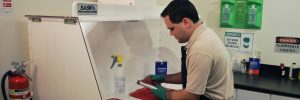
Recently, the US Environmental Protection Agency (EPA) announced the ban and phase-out plan for solvents trichloroethylene (TCE) and perchloroethylene (PCE). These restrictions are completed under amendments to the 2016 Toxic Substances Control Act (TSCA). The EPA’s press release details TCE and PCE risk management rules including the plans to ban both solvents, exempt industries, and… Learn More

 Made in the USA
Made in the USA




